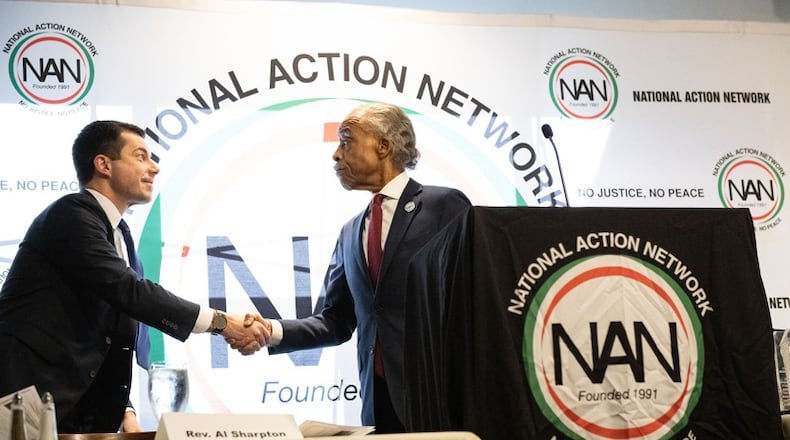In a crowded banquet room at Paschal’s Restaurant, the Rev. Al Sharpton and clergy members from his National Action Network organization held court Thursday with five presidential candidates who took turns at the lectern promising to embrace civil rights as a central cause.
After Sharpton warned that the Trump administration threatened “some of the hallmarks of the 60s movement” that sparked civil rights reforms, he delivered a stern message to the group of a few dozen pastors who crammed into the room.
“This election is going to be one of the most important in American history, and certainly in our lifetime,” he said. “I know we say that all the time, but when you look at it, this time it’s clear.”
Photos: Presidential candidates make their pitch in Atlanta
Related: Democratic candidates take an extra day in Atlanta to woo black voters
Each of the White House hopefuls who followed emphasized progressive parts of their campaign agenda aimed at mobilizing black voters, the most dominant bloc of the Democratic electorate in Georgia and the South.
Billionaire activist Tom Steyer brought up his promise to launch a formal commission to reframe the issue of slavery and “retell the story so we understand what happened, so we understand how we got to where we are.”
U.S. Sen. Cory Booker excited the crowd with a fiery speech about his plan to bring about racial and economic justice if he’s elected. He talked of the U.S. Senate as “the least diverse place I’ve ever worked” when he took office.
“It cannot be about us without us,” he said.
Entrepreneur Andrew Yang tied his “freedom dividend” proposal for a guaranteed minimum income to Martin Luther King Jr.’s legacy and agenda.
“This man died fighting for economic justice,” he said of King. “And that goal hasn’t been met.”
And U.S. Sen. Amy Klobuchar invoked her recently-unveiled voting rights platform, saying she was “appalled” by the election-related controversies that marred last year’s vote.
Related: Bernie Sanders touts $10B plan to boost HBCUs
Related: Democratic candidates text Georgia voters who may be purged
“What if we registered every kid, automatically, when they turn 18?” she asked the crowd. “You tell me we can’t find, in this great nation, the technology to make that happen.”
Mayor Pete Buttigieg of South Bend, Ind. provoked a compelling exchange even before he took the microphone. As he introduced the candidate, Sharpton pushed back on the narrative that black homophobia accounts for Buttigieg's struggle to attract African-American support.
“The media tries to act like homophobia in the black community is different than homophobia in the white community,” he said, scanning the crowd.
“We don’t have an epidemic of homophobia, but we have homophobes in our community. We have some homophobes in here, but we also have people who have family members who are LGBTQ,” he said, adding: “If we support or don’t support Pete Buttigieg, it has nothing to do with whether he’s LGBTQ.”
Related: Atlanta reacts | Who won the Democratic presidential debate?
Photos: Democratic presidential candidates debate in Atlanta
Related: Impeachment hearings play lead role on Democratic debate stage
Buttigieg didn’t directly address Sharpton’s remarks, but nodded to the civil rights activists who have helped expand gay rights, and nodded to a portrait of former Mayor Maynard Jackson hanging near the front of the room as he talked of the need to boost minority-owned businesses.
“There has to be resources, not just good intentions. We learned this the hard way,” he said, talking of the need to end “systemic racism” rooted deeply in U.S. society. “Taking a racist policy and structure and replacing it with a neutral one is not enough.”
About the Author
Keep Reading
The Latest
Featured




